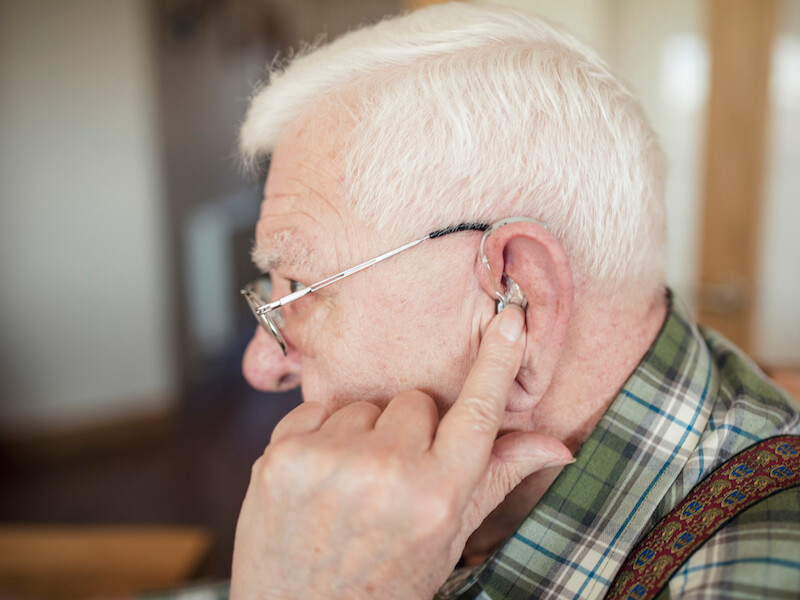
Does it seem like your hearing aid batteries drain way too quickly? The reasons for this are sometimes surprising. What is the average length of time that your hearing aid batteries should stay charged? Anywhere from 3 to 7 days is standard. That range is pretty wide. Actually, it’s so wide that it probably can’t help you predict what should be taking place with your hearing aid. You might be on day 4 at the grocery store when all of a sudden, things go quiet and you’re unable to hear the cashier. Or maybe on day 5, you’re having an enjoyable conversation with friends when you unexpectedly feel very alone because you can’t hear what anyone is saying. Sometimes the batteries don’t even make that 3 day mark. Like when you’re watching TV on day 2 and suddenly you can’t hear the show your that’s on. It’s more than a little inconvenient. You just can’t tell how much battery power you have left in your hearing aids and it’s causing you to miss out on life. Here are the most likely culprits if your hearing aid batteries die quickly.
A Battery Can be Depleted by Moisture
Did you know that humans are one of the few species that produce moisture through their skin? We do it to cool down. It’s the body’s way of purging the blood of sodium and toxins. You might also live in a climate that’s moist and humid. This excess moisture can clog the air vent in your device, making it less reliable. Moisture can also interact with the chemicals of the battery causing it to deplete faster. Here are a few measures you can take to avoid moisture-caused battery drain:
- Don’t keep your hearing aids in the bathroom, kitchen or other moist environments
- if your storing them for several days or more, take the batteries out
- Before you store your hearing aids, open the battery door
- A dehumidifier for your hearing aid is beneficial
Batteries Can be Drained by Advanced Hearing Aid Functions
You get a much better hearing aid today than you did even 10 years ago. But if you’re not paying attention, these advanced features can cause faster battery drain. Don’t quit using your favorite features. But remember, you will have to switch out the battery sooner if you are streaming music from your phone for hours. Noise-canceling, Bluetooth, multichannel, tinnitus relief — all of these additional functions can deplete your battery.
Altitude Changes Can Impact Batteries Too
Moving from a low to high altitude can deplete your batteries, specifically if they’re on their last leg. When flying, skiing or climbing always brings some extra batteries.
Are The Batteries Really Low?
Some models will give you a warning when the battery begins to get too low. As a general rule, these alerts are giving you a “heads up”. It doesn’t mean you have a depleted battery. Additionally, the charge can at times drop temporarily due to altitude or environmental changes and that can activate a false low battery warning. Take the hearing aids out and reset them to stop the alarm. You may be able to get several more hours or possibly even days out of that battery.
Handling Batteries Improperly
You should not remove the little tab from the battery until you’re ready to use it. Steer clear of getting skin oil and dirt on your hearing aid by cleansing your hands before handling them. Never freeze hearing aid batteries. This technique might extend the life of some types of battery but it doesn’t work with hearing aid batteries. Simple handling mistakes like these can cause hearing aid batteries to drain faster.
Buying a Year’s Supply of Batteries Isn’t a Very Good Idea
Buying in bulk is often a smart money decision when you can afford to do it. But the last few batteries in the pack probably won’t have full power. Unless you’re fine with wasting a few, try to stay with a six month supply.
Shopping For Hearing Aid Batteries Online
Shopping from the web can be a good thing. You can get some great deals. But some less honest people will sell batteries online that are very near to the expiration date. They may even be past their expiration date. So you need to be cautious.
Both alkaline (AA, AAA, etc.) and zinc hearing aid batteries have a date they will expire. If you were going to buy milk, you would look at the expiration date. You have to use the same amount of care with batteries. If you’re going to get the most from your pack, be sure the date is well in the future. It’s probably a smart idea to message the vendor if you don’t see an expiration date or even better, come see us for your battery needs. Only buy batteries from trusted sources.
Now You Can Get Rechargeable Hearing Aids
Hearing aids may drain too quickly for numerous reasons. But by taking some precautions you can get more energy out of each battery. If you’re in the market for a new pair of hearing aids, you might decide on a rechargeable model. If you charge them while you sleep, you get a full day of power the next day. And you only have to change them every few years.
